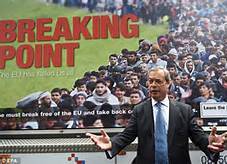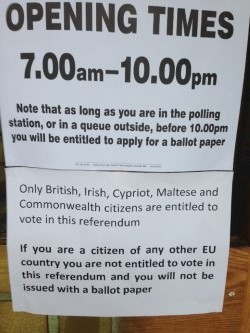Below are two related articles and a letter which examine the mounting tide of racism in the EU referendum and relate it to Britain’s imperial legacy. The first is by Brendan McGeever who is a member of RISE and currently a lecturer in the Sociology of Racialisation and Anti-Semitism. The second is second by Nadine El-Enany is Lecturer in Law. Both work at Birkbeck College, University of London. The letter is written by John Tummon of the Republican Socialist Alliance.
1. RACISM AND THE EU REFERENDUM: A STATE OF EMERGENCY
“Waiting for Lexit is to be the frog in that cautionary tale — the one that sits in boiling water until it is too late.”
The EU referendum has transformed British politics. In just a matter of weeks a devastatingly rightward shift has become evident. It is a shift defined, above all, by the politics of race and nation.
Let us briefly map the terrain: a socialist MP, known for her support for Syrian refugees entering Britain, has been murdered by a fascist. Overt racism is becoming normalised in a way not seen since the late-1970s, so much so that last week Nigel Farage felt confident enough to brandish a billboard explicitly invoking colour-coded racism and fear of the ‘non-white other’. Later that same day, a video emerged of England football fans taunting and throwing coins at Roma children in Lille. This came on the back of footage of the same supporters chanting “fuck off Europe, we’re all voting out”. The deep-seated, racist resentment that has been unleashed by the politics of Brexit is creating a climate in which some migrants and British-born minorities will be looking at their options. The terms of this debate have been set entirely by the right, from the neoliberal mainstream to the fascist extreme. The left, owing to its historic position of weakness, is simply nowhere in this discussion. In short: we are in a state of emergency.
Brexit and the English question
The racism of this referendum campaign is characterised by a deep sense of retreat and loss of prestige. It is about retreating from the damaging impact of a globalised world that is no longer recognisable, no longer ‘British’. You can locate this sentiment pretty much anywhere in Britain, but it is found in its most concentrated form in England. The decline of empire has not led to the overcoming of the English imperial complex, but its retraction into a defensive exclusionary imaginary: ‘we are under siege, it is time to pull up the drawbridge’. This is the force behind the racism that has been unleashed.
It is true that politicians and the mainstream media have played a key role in bringing about this corrosion of basic, multicultural, civic values. Yet we sometimes forget that racism speaks to people, it meets them ‘where they are at’. The racialized codes of belonging that have come to shape dominant understandings of Englishness over the past century continue to assert themselves in the popular imaginary.
Unlike the anti-racist left, politicians such as Nigel Farage have very little work to do: he can parachute into a constituency and let racism do its work, since he is able to draw not just on the ‘mainstream political consensus’, but on active and deeply embedded forms of consciousness. By drawing on these elements, the racism of the Leave campaign is able to win ground, since it speaks to currents that have been secured over a long period of time; their trace and resonance is found in ‘popular inventories’, as Stuart Hall once put it, and the racist right know exactly where to look.
This is a racism that also reaches across a range of class positions. It speaks to the defenceless working class subject, squeezed by the flexibility of his or her precarious position; it resonates with the increasingly parochial and isolated English national bourgeois. Self-ascribed whiteness and the allures of the nation bind these oppositional class forces at the ballot box.
Immigration: the racialization of the EU referendum
As is now clear, the EU Referendum is defined by a single issue: immigration. This has been brewing for some time. In the 1980s and 1990s, no more than 10% of the UK population saw immigration as a key issue. The hardening of attitudes in more recent years has seen that figure rise dramatically to 30-40%, such that by 2006 immigration was recorded as the most important issue facing the country.
What often gets lost, however, are the horrific consequences that this has within the daily lives of many racialized minorities. In England, one hundred and thirty racist incidents occur on average every single day, and this figure accounts for only those incidents reported to the police. Despite the rich multiculture of many British cities, racism continues to structure the daily lives of racialized minorities, the vast majority of which live in England. It is difficult to see how the politics of this referendum campaign will do anything other than to entrench and extend this everyday racism.
The implosion of the Left and the fallacies of ‘Lexit’
Despite the mounting racism both here and across Europe, many socialists seem committed to a so-called ‘Lexit’ strategy. An exit on left terms would require a number of things to be in place: the potential for left-wing arguments to actually be heard, an audience willing to listen, a group of organic intellectuals capable of winning workers over to socialist and anti-racist arguments within the trenches of civil society – yet not one of these conditions exist in this referendum. Brexit might be a ‘blow’ for the British ruling class as ‘Lexiters’ claim; it will likely mean something much, much worse for those who are at the sharp end of racism.
When set in a wider European context, the desperateness of our situation becomes even clearer: the far right are in the ascendency in the majority of European states. A Brexit and possible break-up of the EU would see the far right further vindicated across Europe. Have ‘Lexiters’ thought seriously about how this might unfold, for example, in central and east Europe, where racist nationalism, far-right Euroscepticism and anti-migrant sentiment are being secured at the level of the mainstream? In some parts of Europe, working out a strategy for resisting the actuality of fascism is fast becoming an urgent task.
Beyond June 23: resources of hope
Where, then, can we locate the resources of hope? The strategies that succeeded in the radical struggles of the past will not translate directly to the present. The hollowing out of a socialist culture, the decline in organised anti-racism and the utter retreat of the labour movement over the past 25 years have put us in an unprecedented situation.
Possible bulwarks against racist resentment in Britain today are not easily identifiable, and nor are they readily available in a political sense. However, we can perhaps offer a sketch of where they might lie. The multi-ethnic composition of England – a direct consequence of Empire – has reservoirs of resistance, those minority communities in which the struggles of past and present injustices are deposited. Any push back against the exclusionary narrowing of Britishness and Englishness will involve those who directly incur the injuries of racism.
In a more everyday sense, there is hope to be found in the very fact of contemporary multi-ethnic life in Britain. We are, to put it simply, much more entangled in each other’s lives. Nearly one in ten people in England and Wales are involved in a mixed relationship, and nearly half of these involve someone from the majority ‘white’ population. The retreat of collectivism that has come to define the neoliberal era has also been accompanied by the emergence of an everyday multicultural reality, particularly among younger generations. Therein, perhaps, lie the seeds of a future push back against the racist present.
Those who are thirty-five and under grew up in the slipstream of the anti-racist struggles of the 1970s and 1980s. They encountered a Britain transformed by the marginal – but nevertheless very real – gains of the anti-racist movement that preceded them (equality provisions at work, multicultural education in schools, an established anti-racist civic culture and so on). However much these gains are being rolled back, their imprint is traceable in the ease with which many young people handle the lived realities of multi-ethnic life in Britain. In this sense, the anti-racist victories of the past have their returns in the present, even though the political conjuncture could not be more different.
In twenty first century Britain, once again, the right of some to live and breathe the same air as the ‘majority population’ is under question. The targets are both new and familiar: European migrants, refugees from the Global South, and those black and brown British communities whose status has always been challenged by the stain of a racializing white nationalism. Turbulent times lie ahead; the search for anti-racist futures has acquired a new degree of urgency.
21.6.16
This was first posted at:- https://www.opendemocracy.net/uk/brendan-mcgeever/racism-and-eu-referendum-state-of-emergency
_______________
2. BREXIT AS NOSTALGIA FOR EMPIRE
The run up to the EU referendum has shown Britain for what it is. Woodwork: the washed-up bracken of the British Empire, and the ugly flotsam of its legacy of racism.
This week Jo Cox, a pro-immigration Labour MP was brutally murdered by a man who shouted Britain First as he killed her and who gave his name in court on being charged with her murder as “Death to traitors. Freedom for Britain”. Jo Cox was killed a week before the referendum on Britain’s EU membership and following months of campaigning which has been dominated by the topic of migration. This referendum has not felt like an exercise in democracy. There is something painfully undemocratic about denying EU citizens from other Member States living in Britain a vote.
The message to them is that they do not belong here. Their neighbours, co-workers, friends and family decide on their future for them. Worse still, the referendum has licensed the expression of racism and xenophobia, which has been unleashed with deadly consequences. The racist discourse that has defined the Brexit campaign must be understood in the context of Britain’s imperial legacy. The terms on which the debate around the referendum have taken place are symptomatic of a Britain struggling to conceive of its place in the world post-Empire.
In this context waiting for Lexit is to be the frog in that cautionary tale — the one that sits in boiling water until it is too late. I have taught EU law for many years and have always tried to instil in my students a healthy scepticism about the EU. I have worked to show them that it is possible to be critical of the neoliberal, capitalist, imperialist EU and not fall into the anti-migrant, sovereignty-fetishising UKIP camp. When the EU referendum was first announced, I made a Lexit argument when the topic came up. A vote for the EU is a vote for capitalism, austerity and militarised borders, I’d say.
The reality is that argument has elicited only the minutest of echoes. The Brexit campaign has been entirely dominated by the ugliest form of Euroscepticism imaginable. As Priyamvada Gopal has put it, a vote for Brexit is a vote for the “magnificent lie that exploitation, austerity, greed and impoverishment have all come to Britain from the nasty outside”. Lexit is a dream that has not been realised. Waiting for Lexit is like waiting for Godot — in more ways than one. Graham Hassell has aptly described Beckett’s play of that name as “a metaphor for… mainland Britain, where society has ever been blighted by a greedy ruling élite keeping the working classes passive and ignorant by whatever means.”
The “means” adopted by the Brexit campaign in a bid to sway voters have primarily consisted of scare-mongering on the issue of migration. Despite the rhetoric about migrants being a drain on resources, HMRC tax figures for 2013–14 show that migrants contributed £2.5 billion more than they took out in benefits, but I will neither myth-bust around migration nor be drawn into a debate about whether or not migrants enrich the societies in which live we because fundamentally that is a racist question — it erases the history of the British Empire which has set in motion the migration of today and assumes a pre-existing, static society, membership of which can only be validly determined by birthright. Migrants tend to have the least capital and so are easiest to exploit. We have seen this in the unrelenting scapegoating of migrants that has characterised the Brexit campaign, a convenient distraction from the material consequences of the current government’s austerity measures.
It is not that I expected better of Michael Gove, Boris Johnson and Nigel Farage. I merely hoped they would not succeed, as they have, aided by the British mainstream media, in drowning out the possibility for a Left movement in opposition to the EU to emerge.
It is difficult to choose a low point in the Brexit campaign. Was it when Nigel Farage had the gall to say to a black woman who challenged him on the racist rhetoric of the Brexit campaign in the course of a live televised debate that he is “used to being demonised”? Or Michael Gove’s Islamophobic rant about Turkish birthrates and criminality? Or UKIP donor-funded Leave EU’s recent tweet, “act now before we see an Orlando-style tragedy here before too long”?
Or Farage’s latest poster depicting non-white refugees crossing the Croatia-Slovenia border in 2015 along with the slogan “Breaking Point”, which has been reported to the police for inciting racial hatred?
Being faced with a choice between between David Cameron and Nigel Farage is a nightmare scenario for any anti-racist and anti-capitalist. With the debate on the referendum eclipsed by the topic of migration, it is no surprise Cameron is struggling to hold the fort having spent the last five years peddling the lie that migrants are to blame for society’s ills rather than his government of millionaires and their penchant for cuts to vital public services. But if Britain votes Leave, it does so on the terms of the racist and xenophobic Brexit campaign. A Leave vote would provide a mandate for Brexit leaders to push for Fortress Britain, which already exists insofar as it can as an EU Member State. Britain is the most fortified of all EU countries. It is not part of Schengen. It has a flexible opt-out from all EU law on immigration and asylum, which it has consistently exercised to opt into restrictive measures that further strengthen its capacity to exclude and out of those aimed at enhancing protection standards.
There is no “refugee crisis” in Britain. Britain has barely increased its resettlement quota in light of the movement of so many desperate Syrians, and a similar number of asylum applications have been made in Britain this year as in 2008 unlike the higher numbers we see in other EU countries. Britain has been the strongest advocate of the EU Dublin Regulation, which sees people seeking asylum confined to Southern Europe, sometimes under conditions found to constitute inhuman and degrading treatment by the European Court of Human Rights. We will see no loosening of Britain’s borders if it leaves the EU, quite the opposite. A Leave vote would provide a validating framework for the enactment of the ugly promises the Brexit campaign has made — take their wish for an Australian style immigration system for example, an idea originally proposed by Tony Blair, inspired by Australia’s “Pacific Solution”. We know what that looks like, visas for the white and privileged while brown and black refugees self-immolate in prisons on remote Pacific islands.
Nor is there a “migration crisis” in Britain. The only crisis identifiable is that caused by a capitalist system which sees the ongoing enrichment of the few and impoverishment of the many. Capitalist and imperialist structures enable oppression on a mass scale. Leaving the EU is not going to ameliorate this. In fact, the British government was so afraid that the EU might empower British workers that it negotiated an opt-out from the EU Charter of Fundamental Rights because it guarantees the right of workers to take strike action. Unlike in other EU countries, there is no right to strike in Britain. Successive governments have legislated to curtail the possibility for industrial action, the most recent assault being in the form of the Trade Union Act 2016.
The run up to the EU referendum has shown Britain for what it is. Woodwork: the washed-up bracken of the British Empire, and the ugly flotsam of its legacy of racism. From this woodwork the Brexiters have emerged. They have long romanticised the days of Empire when Britannia ruled the waves and was defined by its racial and cultural superiority. It is no coincidence that Farage has a preference for migrants from India and Australia as compared with East Europeans, and has advocated stronger ties with the Commonwealth. This referendum has not been about Europe, but about Britain and its imperial legacy. For Brexiters, turning their back on Europe and turfing out their neighbours is a step toward salvaging the shipwreck of the British Empire, which saw the exploitation of peoples, their subjugation on the basis of race, a system that was maintained through the brutal and systematic violence of the colonial authorities.
The violence in the Brexit rhetoric of “taking back control of our borders”, of excluding others for self-interested goals at a time when thousands of refugees are dying at sea, is resonant of the racism that pervaded imperial Britain at the time of the 1781 Zong massacre which saw slaves thrown overboard by their captor to save a British slave ship and in the interest of profiting from an insurance claim. If what we want is to live in a more equitable society, it is dangerous to begin by voting for an outcome which has been driven by racism. A nostalgia for empire is no starting point for emancipatory struggle based on solidarity with the oppressed.
19.6.16
This was first posted at:- http://criticallegalthinking.com/2016/06/19/brexit-nostalgia-empire/
________
3. LETTER FROM JOHN TUMMON OF THE REPUBLICAN SOCIALIST ALLIANCE
This plebeian revolt behind the Leave victory is grounded in the coming of age of several long-term developments in the conditions of the English & Welsh working class: a) the failure of public debate to deal with British imperialist history and the way, according to Gramsci’s theory of hegemony, that the resultant national narrative (monarchism, justifiable expansionism, racism) becomes part of the ideology of the working class; b) the indebtedness of the working class via de-regulation of the money supply & banks and the use of credit-induced indebtedness to hook people on, resulting in the atomised experience of immiseration rather than the experience of collective immiseration of previous eras of capitalism; c) the defeats and decline of trade unionism and all / most independent working class self-organisation by neoliberalism; d) increasing globalisation and the resultant crisis of political legitimacy; e) the Blairite adaptation of the Labour Party to globalisation and the resultant disappearance of that party’s links to impoverished communities; f) the rise of the politically organised right (first the BNP, then UKIP) in these communities and the working class recruits to these organisations, such that these right wing parties become seen as ‘of us’ in the way that Labour used to be.
This Referendum, with the compliance of the media, has subjected the working class to a daily diet of repetition of the core national bourgeois ideology: a) what is ‘best for business’ is best for the entire society because of trickle down economics & b) immigration is a problem and must be controlled. Alongside this, the constant war of spinning rival facts and soundbites between the two camps has so devalued political discourse that making choices on the basis of irrational ‘feeling’ has been vindicated. Vulnerable, impoverished communities have voted on the basis of their feelings – of being on the end of discrimination & unfairness, of not being respected but dismissed as ‘chavs’, of being forced to compete with migrants over ever more scarce resources and, above all, of not being listened to with any empathy.
We are now in a shocking new reality which has risen up from these historical factors which have been churning away inside the working class for decades to bite us hard on our rear ends.
We need to adjust our understanding of reality, of the state & potential of class struggle, of politics if we are to have any relevance to what happens over the next few years.
________
For further articles developing this theme see:-
A POLITICAL COMPARISON BETWEEN THE 2012-14 SCOTTISH INDEPENDENCE AND THE 2016 EU REFERENDA CAMPAIGNS
________
Also read:- Flying the flag for neoliberalism by Liz Fekete in Race & Class, Volume 58, no. 3 January-March, 2017




